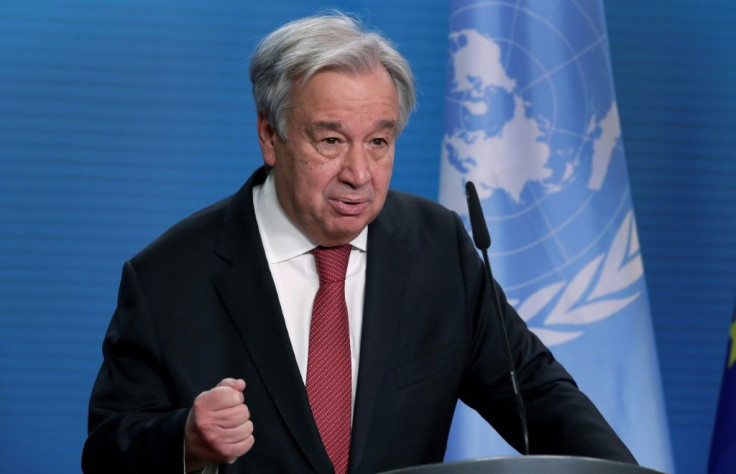UN Chief Says Syria Border Must Stay Open For Aid
UN Secretary General Antonio Guterres said Tuesday that a closure of the last remaining border crossing into Syria would halt the distribution of Covid-19 vaccines across the northwest of the country.
Currently, relief supplies into Syria can enter at only one crossing -- Bab al-Hawa on the Turkish border, where about 1,000 trucks cross monthly.
In 2014, the UN Security Council allowed aid operations to cross at four points but last year -- after objections from Russia and China -- this was reduced to just Bab al-Hawa being allowed to stay open for an initial period of 12 months.
Guterres said it was vital to extend operations for another year.
"A failure to extend the UN's mandate would end the UN's Covid-19 vaccine distribution plans for millions of people in northwest Syria, and greatly diminish essential humanitarian operations," Guterres told the UN General Assembly as he described Syria's grim conditions after a decade of war.
"Food and other humanitarian aid deliveries by the United Nations would halt immediately. Less food will mean more suffering and more conflict."
Guterres' remarks came after US Secretary of State Antony Blinken on Monday urged the reopening of aid crossings blocked by Russia.
Russia, which supports Damascus, says the UN mandate on the border violates Syria's sovereignty and it has indicated it wants to close Bab al-Hawa when the current provision expires in July.
Guterres addressed the UN as donors met online in an event hosted in Brussels, which aimed to attract billions of dollars in new aid pledges for Syria.
"Nine in 10 Syrians now live in poverty, with 60 percent of the population at risk of going hungry this year -- the highest number ever in the history of the Syrian conflict," Guterres said.

He added that Syria has created the world's largest refugee crisis and that money raised in Brussels aimed to help some some 12.3 people in need across Syria as well as 5.6 million Syrian refugees in the region.
As for the pandemic, it is hard to know the extent Covid-19 has impacted Syria because of weak testing.
Officially, more than 2,000 people have died.
But "thousands more cases are going unconfirmed due to dangerously low testing rates," Guterres said.
He said two requests had been made for Syria to use the World Health Organization's COVAX facility that aims to provide the vaccine to countries in need.
Plans are under way to deliver a first tranche in the coming weeks, covering around three per cent of the population.
"An initial one million doses are allocated to the Syrian Ministry of Health, including 100,000 for northeast Syria. And an initial 224,000 doses are allocated for northwest Syria," Guterres said.
prh/wat/dw
© Copyright AFP 2024. All rights reserved.







